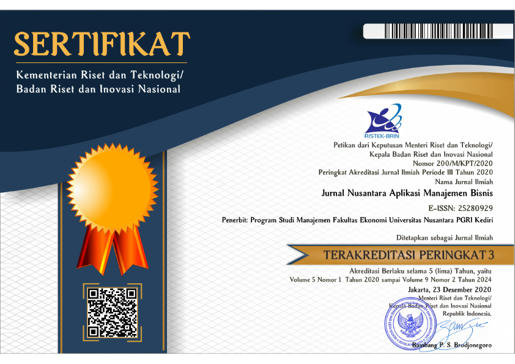Marketing Strategy for Facing Changes in Consumer Behavior in Disruption Era
DOI:
https://doi.org/10.29407/nusamba.v8i2.20634Keywords:
Marketing Strategy, Consumer Behaviour, Generation Y, Generation Z, Disruption EraAbstract
Research aim : This study aims to analyze marketing strategies in dealing with changes in consumer behavior of generation Y and generation Z in the era of disruption
Design/Methode/Approach : The analysis technique of this research is interactive analysis
Research Finding : The outcomes of research are conventional marketing strategies are still proven to be effective in accompanying digital marketing strategies in this era of disruption, in other words, the digital marketing strategy formed in this study is a development of the marketing mix strategy, especially the online promotion part as a result of changes in the behavior of the two generations in this era of disruption
Theoretical contribution/Originality : Provides reinforcement of the theory of marketing strategies used in dealing with changes in the behavior of generations Y and Z in this era of disruption
Practitionel/Policy implication : Provide policy recommendations for company management for marketing strategies used in dealing with changes in the behavior of generations Y and Z in this era of disruption
Research limitation : The limitation of this research is still a qualitative method so that in the future it will be strengthened by using a quantitative method
Downloads
References
Prasetyo BD, Kurniadi R, Setyowati R. Industry 4.0 and the future challenges for the local community to manage eco-tourism (a case study of the participatory eco-tourism management in Menipo Island, West Timor, Indonesia). IOP Conf Ser Earth Environ Sci 2020;533:0–13. https://doi.org/10.1088/1755-1315/533/1/012002.
Thukral E. COVID‐19: Small and medium enterprises challenges and responses with creativity, innovation, and entrepreneurship. Strateg Chang 2021;30:153–8.
Herman LE, Sulhaini S, Farida N. Electronic Customer Relationship Management and Company Performance: Exploring the Product Innovativeness Development. J Relatsh Mark 2021;20:1–19. https://doi.org/10.1080/15332667.2019.1688600.
Rocque SR. Business Innovation Models of Indian E-Commerce Start-Ups to Create Successful Business Competing Against Global Players. Cent ASIAN J Innov Tour Manag Financ Vol 2023;4:52–64.
Wijaya IGNS, Ekayasa MD. Perilaku Keputusan Pembelian Generasi Y dan Z Dalam Penggunaan E-Commerce Di Masa Pasca Pandemi Jurnal Nusantara Aplikasi Manajemen Bisnis. J Nusant Apl Manaj Bisnis 2022;7:338–57.
Subawa NS, Widhiastini NW, Pika PATP, Suryawati PI, Astawa IND. Generation Z Behavior and Low Price Products In The Era of Disruption. Int J Soc Sci Manag Rev 2020;03:1–12.
Kwok L, Tang Y, Yu B. The 7 Ps marketing mix of home-sharing services: Mining travelers’ online reviews on Airbnb. Int J Hosp Manag 2020;90:102616.
Pee LG. Negative Online Consumer Reviews: Can the Impact be Mitigated? Int J Mark Res 2016;58:545–68.
Pandey P, Suwunniponth W, Techarattanased N, Klaysung C. ONLINE MARKETING MIX FACTORS AFFECTING ONLINE. |The 2023 Int. Acad. Multidiscip. Res. Conf. Fukuoka, 2023, p. 229–38.
Li F, Larimo J, Leonidou LC. : Definition, Conceptualization, Taxonomy, Validation, and Future Agenda. J Acad Mark Sci 2020.
Hajarian M, Camilleri MA, Díaz P, Aedo I. A taxonomy of online marketing methods. Strateg. Corp. Commun. Digit. age, Emerald Publishing Limited; 2021, p. 235–50.
Sedej T. The role of video marketing in the modern business environment: A view of top management of SMEs. J Int Bus Entrep Dev 2019;12:37–48. https://doi.org/10.1504/JIBED.2019.103388.
Subawa NS, Widhiasthini NW, Astawa IP, Dwiatmadja C, Permatasari NPI. The practices of virtual reality marketing in the tourism sector, a case study of Bali, Indonesia. Curr Issues Tour 2021;24:3284–95. https://doi.org/10.1080/13683500.2020.1870940.
Agung NFA, Darma GS. Opportunities and Challenges of Instagram Algorithm in Improving Competitive Advantage. Int J Innov Sci Res Technol 2019;4:744–5.
Mehedintu A, Soava G. A Structural Framework for Assessing the Digital Resilience of Enterprises in the Context of the Technological Revolution 4.0. Electron 2022;11. https://doi.org/10.3390/electronics11152439.
Gazzola P, Pavione E, Pezzetti R, Grechi D. Trends in the fashion industry. The perception of sustainability and circular economy: A gender/generation quantitative approach. Sustain 2020;12:1–19. https://doi.org/10.3390/su12072809.
Cenamor J, Parida V, Wincent J. How entrepreneurial SMEs compete through digital platforms: The roles of digital platform capability, network capability and ambidexterity. J Bus Res 2019;100:196–206.
Elkins E. Algorithmic cosmopolitanism: on the global claims of digital entertainment platforms. Crit Stud Media Commun 2019;36:376–89. https://doi.org/10.1080/15295036.2019.1630743.
Arifuddin M, Qamari IN, Surwanti A. Digital Literacy, Digital Culture and Business Performance: A Comprehensive Conceptual Framework. J Mark Emerg Econ 2022;2:59–67. https://doi.org/10.1177/002224298504900120.
Olbrich R, Schultz CD, Bormann PM. The effect of social media and advertising activities on affiliate marketing. Int J Internet Mark Advert 2019;13:47–72.
Kumar P, Singh G. Using social media and digital marketing tools and techniques for developing brand equity with connected consumers. Handb. Res. Innov. Technol. Mark. Connect. Consum., IGI Global; 2020, p. 336–55.
Tien N. ., Jiminez Santural Jose R, Phuong Mai N, Tien Dung H, Thi Hoang Oanh N, Huynh Phuoc N. Digital marketing strategy of GUMAC and HNOSS in Vietnam fashion market E-learning, E-government, E-business View project Higher education management View project International Journal of Multidisciplinary Education and Research Digital marketing strategy. Int J Multidiscip Educ Res 2020;5:1–5.
Downloads
Published
Issue
Section
License
Authors who publish with this journal agree to the following terms:
- Copyright on any article is retained by the author(s).
- The author grants the journal, the right of first publication with the work simultaneously licensed under a Creative Commons Attribution License that allows others to share the work with an acknowledgment of the work’s authorship and initial publication in this journal.
- Authors are able to enter into separate, additional contractual arrangements for the non-exclusive distribution of the journal’s published version of the work (e.g., post it to an institutional repository or publish it in a book), with an acknowledgment of its initial publication in this journal.
- Authors are permitted and encouraged to post their work online (e.g., in institutional repositories or on their website) prior to and during the submission process, as it can lead to productive exchanges, as well as earlier and greater citation of published work.
- The article and any associated published material is distributed under the Creative Commons Attribution-ShareAlike 4.0 International License












